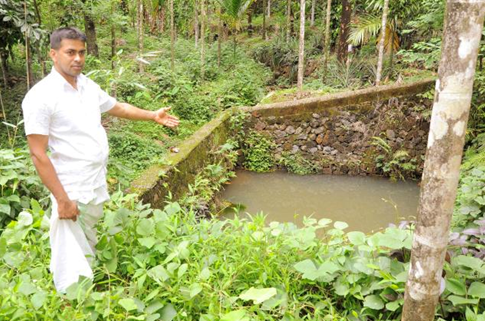| Simple technologies offer effective solutions |
 |
|
For details please contact: |
| |
Name |
: |
Mr. Joji P.Daniel |
| |
Designation |
: |
Programme Coordinator |
| |
Address |
: |
Pullancheri House, Paramba Post, Parappa (Via), Kattamkavala, Kasaragod |
| |
Mobile |
: |
09447880525 |
| |
|
| |
Name |
: |
Dr.T.S. Manoj Kumar |
| |
Designation |
: |
Programme Coordinator |
| |
Address |
: |
Chowki, Kudlu Post Office, Kasaragod,Kerala 671 124 |
| |
Mobile |
: |
09400334940 |
| |
Phone |
: |
04994 232993 |
| |
email |
: |
cpcrikvk1@yahoo.com |
| |
|
Compared to grains like paddy or wheat, vegetables are considered quick money for a farmer. It takes 3-4 months for the vegetable crops to start yielding and generate income compared to paddy, wheat or fruit trees.
Having a shorter life span, the crops are more prone to insect pests and disease attack mainly due to their tender and soft skin. Be it traditional varieties or hybrids the fact remains that the crop gets infested with pests and till date complete control over the pests has been a challenging task.
New problems
“Especially farmers’ dependence on pesticides and their indiscriminate use have made the pests resistant and also contaminate the vegetables since the soft skin absorbs the toxic within it. Introduction of high yielding varieties and hybrids, no doubt, increased production manyfold but also resulted in changes in pest scenario and many new pest problems have emerged,” says Dr. T.N. Devaraja, Programme coordinator, Taralabalu KVK, Davanagere, Karnataka.
A survey carried out in the country indicates that 50-70 per cent of vegetables are contaminated with insecticide residues, according to him. It becomes the responsibility of the scientists and agricultural experts to create awareness among farmers about the right dosage of inputs to be used and if need be suggest alternatives to chemicals while taking care to see the yield does not dwindle. Siddanur village in Davanagere district is a major tomato growing region and apart from tomatoes, maize, cotton, arecanut, banana, pomegranate and other vegetables are also cultivated.
Indiscriminate sprays
Farmers have been spraying huge amounts of pesticides for management of pest and diseases in these crops especially tomatoes.
But far from being solved the problem persisted.Some of the farmers contacted the Taralabalu KVK for a viable solution.“The village is situated 17 kilometres away from the district head quarters and has 200 farm families. When the farmers met us we decided to set up a pilot demonstration unit on composite management strategies for the crop in a field of a volunteer farmer,” says Mr. T.N. Prasanna Kumara, plant protection specialist at the institute.
It is a multidisciplinary model and has a special role in increasing the production of food grain, because it manages insect-pests through minimum use of pesticides, which helps in achieving higher production.
Some of the technologies used in this method are nylon nets, planting marigold as trap crop, installation of bird perches, using 4-5 pheromone traps and application of bio inputs like trichoderma and neem cake.
Net income
The net return fromm these practices in the field for 4-5 months was Rs.1,69,000 from a hectare as compared to Rs.91,250 previously.
Farmers should take into account that this income has been generated in the field which had carried out all the specific instructions and was monitored by the expert team.It was a pilot study to prove that adopting these types of practices can increase income from such crops, according to Mr. Prasanna.
“My personal opinion is that like grains, there should be a minimum support price for vegetables like onion, tomatoes and brinjals.
No proper pricing
“As of now there is no fixed slab on the market price for these vegetables and their sales has always been mercurial, sometimes farmers discarding the vegetables for lack of good price,” says Dr. Devaraja.
Farmers in the region were invited by the Kendra to see for themselves how this method has been helpful in increasing yield and income. The result is, today about 20 acres in the village have come under this technology.
|

